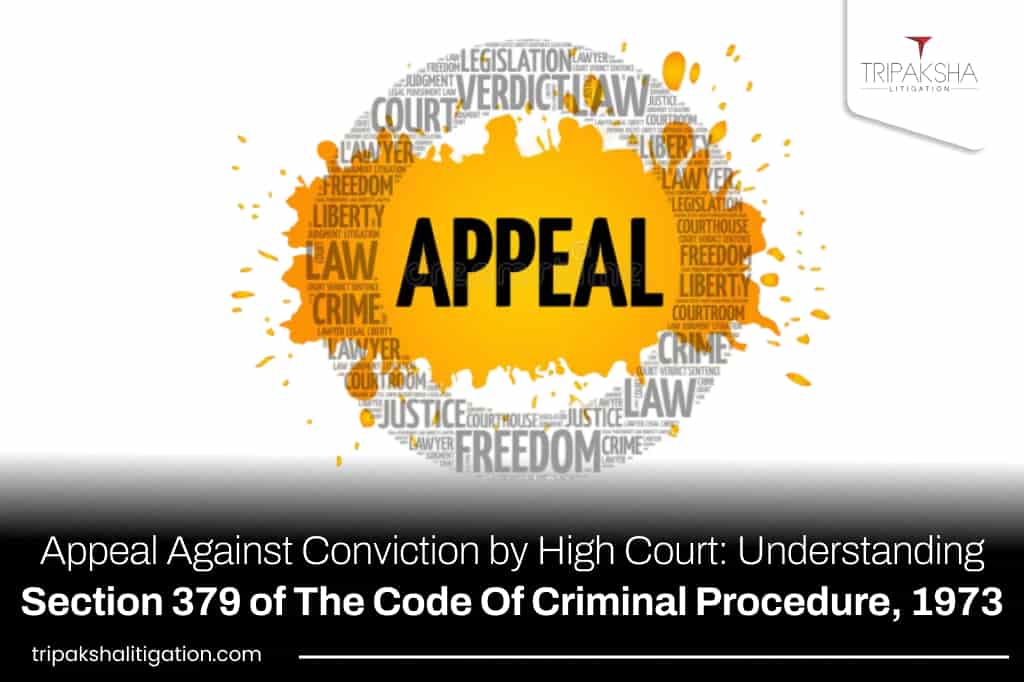In the intricate web of legal frameworks that define the Indian judiciary, the provision for appeal stands as a cornerstone of justice. Among the array of legal statutes that delineate the appellate process, Section 379 of The Code of Criminal Procedure, 1973, holds particular significance. This provision empowers the High Court to entertain appeals against convictions in certain cases, offering a pathway for redressal to those aggrieved by the decisions of lower courts. In this comprehensive exploration, we delve into the intricacies of Section 379, examining its scope, procedural nuances, grounds for appeal, the role of judicial discretion, and its overarching significance in the pursuit of justice.
The Essence of Section 379
At its core, Section 379 embodies the essence of appellate jurisdiction vested in the High Court. It confers upon the High Court the authority to entertain appeals against convictions rendered by its own judgment. However, it’s imperative to underscore that the provision is not a blanket mechanism for challenging convictions across the board. Rather, it applies specifically to cases where the High Court itself has pronounced the conviction, thereby ensuring a hierarchical system of adjudication within the judicial hierarchy.
The Scope of Section 379
To comprehend the scope of Section 379, it’s essential to delineate its parameters. The provision operates within the realm of criminal jurisprudence and applies exclusively to cases involving convictions by the High Court. It’s noteworthy that appeals against convictions initiated by lower courts fall under distinct provisions of the criminal procedural code. Section 379 serves as a safeguard against potential miscarriages of justice originating from the judgments of the High Court, thereby reinforcing the principles of fairness and equity in the legal system.
The Procedural Nuances:
Navigating the procedural labyrinth of appellate jurisdiction necessitates a meticulous understanding of the procedural nuances enshrined in Section 379. Upon conviction by the High Court, the aggrieved party is entitled to invoke Section 379 to file an appeal. However, adherence to prescribed timelines and procedural formalities is imperative. Failure to comply with these requirements can render the appeal vulnerable to dismissal on procedural grounds, underscoring the significance of procedural compliance in the appellate process.
Grounds for Appeal:
Central to the appellate process under Section 379 are the grounds upon which appeals can be predicated. Appellants can invoke a myriad of legal contentions ranging from errors in legal interpretation to procedural irregularities. These grounds encapsulate substantive legal issues that undermine the integrity of the conviction, warranting judicial review. It’s incumbent upon the appellant to substantiate their contentions with cogent evidence and persuasive legal reasoning, thereby laying the groundwork for a successful appeal.
The Role of Judicial Discretion:
In the realm of appellate jurisdiction, judicial discretion assumes paramount importance. Section 379 vests discretionary powers in the High Court to entertain appeals and adjudicate upon their merits. The exercise of judicial discretion entails a comprehensive assessment of various factors including the gravity of the offense, the sufficiency of evidence, and the presence of substantial legal issues. This discretionary authority ensures a balanced approach, safeguarding against the proliferation of frivolous appeals while upholding the principles of justice and equity.
The Quest for Justice:
Embedded within the fabric of Section 379 is the overarching quest for justice. As the cornerstone of appellate jurisdiction, this provision embodies the enduring pursuit of justice in the face of adversity. It serves as a beacon of hope for those aggrieved by wrongful convictions, offering a pathway for redressal and rectification. In a legal landscape fraught with complexities and uncertainties, Section 379 stands as a testament to the resilience of the Indian legal system in upholding the rights and liberties of its citizens.
Conclusion:
In the grand tapestry of legal provisions, Section 379 of The Code of Criminal Procedure, 1973, emerges as a pivotal mechanism for rectifying miscarriages of justice. By conferring appellate jurisdiction upon the High Court, it ensures that the pursuit of justice remains an enduring endeavor. As the legal fraternity navigates the intricacies of criminal jurisprudence, Section 379 stands as a beacon of hope, reaffirming the indomitable spirit of justice and equity in the Indian legal system.
You may contact me for consultation or advice by visiting Contact Us and Call us

